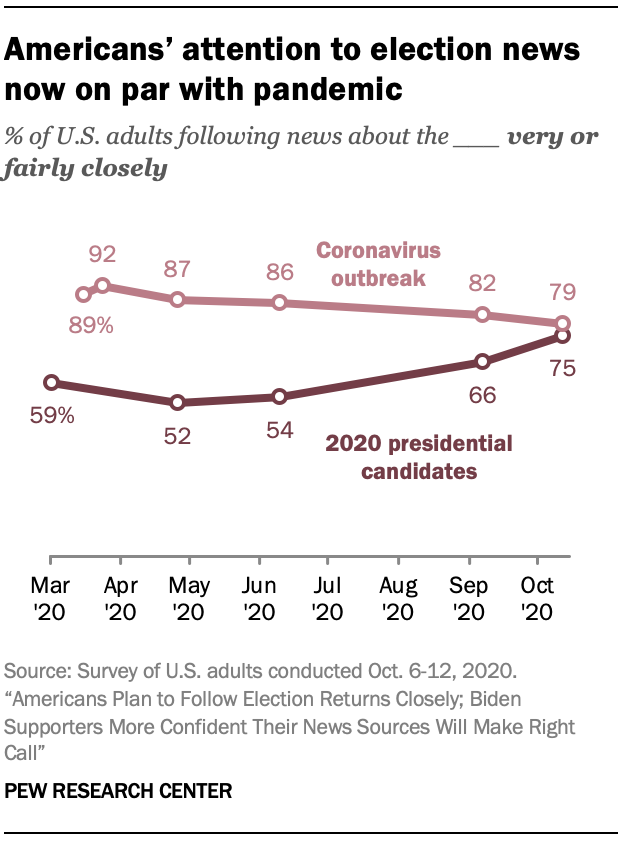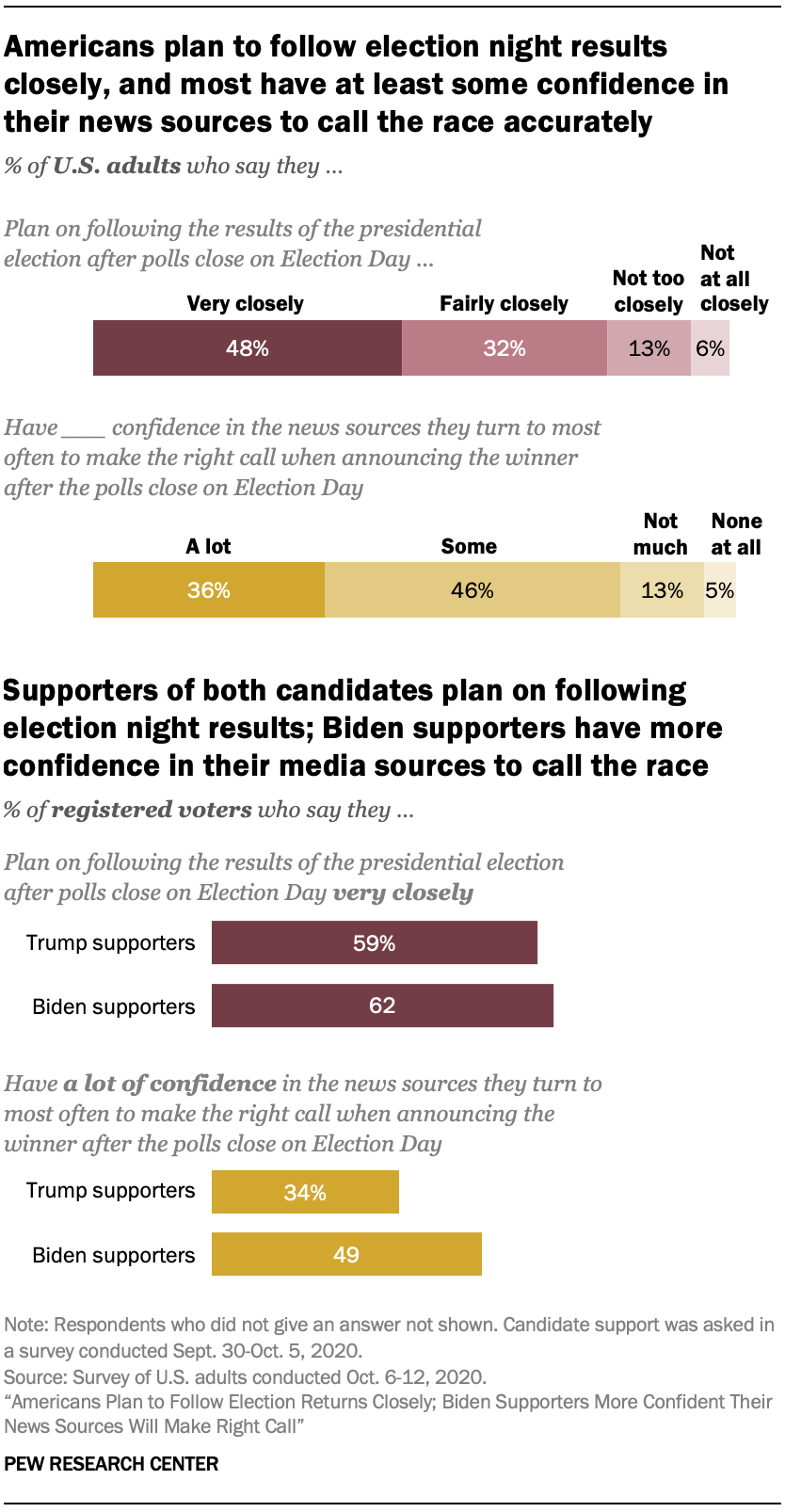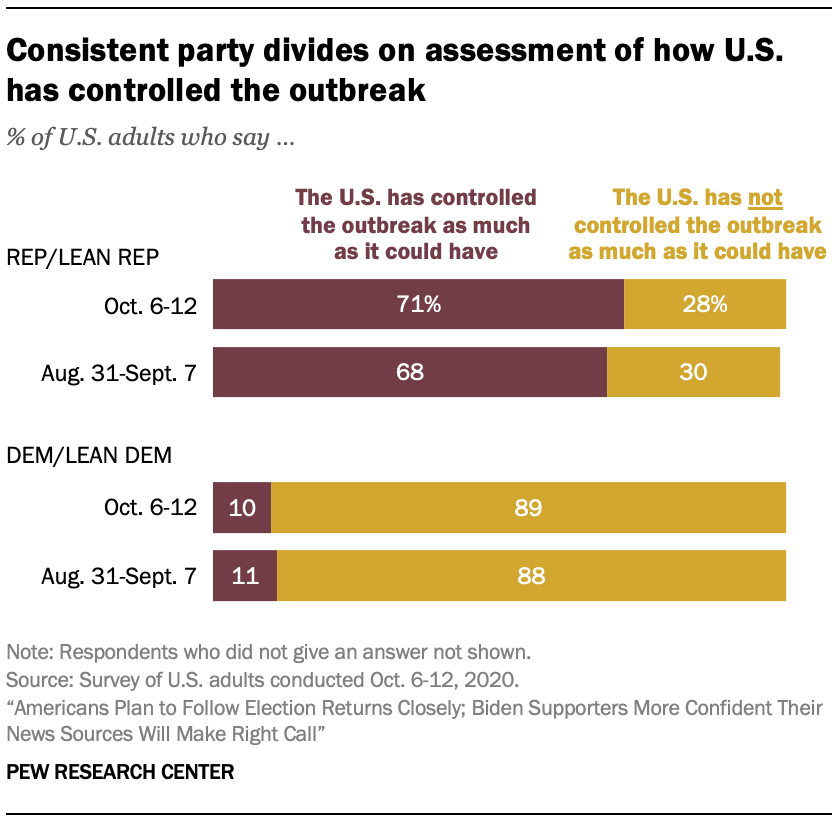Pew Research Center’s American News Pathways project conducted this study to understand how Americans are engaging with and perceiving news coverage of the 2020 presidential election and the COVID-19 pandemic.
For this analysis, we surveyed 10,059 U.S. adults between Oct. 6-12, 2020. Everyone who completed the survey is a member of Pew Research Center’s American Trends Panel (ATP), an online survey panel that is recruited through national, random sampling of residential addresses. This way nearly all U.S. adults have a chance of selection. The survey is weighted to be representative of the U.S. adult population by gender, race, ethnicity, partisan affiliation, education and other categories. Read more about the ATP’s methodology.
See here to read more about the questions used for this report and the report’s methodology.
Visit our interactive data tool to access the questions included in this report, as well as content about the coronavirus outbreak and the 2020 presidential election.

With the country just a couple of weeks away from Election Day 2020, attention to news about the presidential candidates has increased. For the first time since the coronavirus outbreak began in earnest in the United States, Americans are following the election as closely as the pandemic.
And, amid questions over how mail-in ballot counting could impact the timing of results, Americans plan to tune in closely to election night returns, according to a new survey of 10,059 U.S. adults conducted Oct. 6-12, 2020. This survey is part of the ongoing American News Pathways project at Pew Research Center.
At the same time, during a month when it was made public that President Donald Trump and several others in the White House were infected with the coronavirus – connecting it even more closely to the election – Republicans’ sense that it has been overplayed and controlled as much as possible remains largely unchanged. This is also true among Republicans who rely on Trump and his coronavirus task force for news about the outbreak.
Overall, three-quarters of U.S. adults say they are paying “very” or “fairly” close attention to news about the 2020 presidential candidates. That is up from 66% just a month ago and includes 39% who are paying very close attention. It also brings the share of Americans who are closely following the election roughly in line with the share closely tracking coronavirus news (79%), attention that has remained high since the outbreak hit the U.S. in early March.

Americans plan to pay even closer attention as results come in on election night. Roughly half of U.S. adults (48%) say they plan to follow results after polls close on Nov. 3 very closely, and another 32% plan to do so fairly closely. Just 6% plan to follow the results not at all closely.
What’s more, in what will likely be a more complicated ballot counting scenario than normal due to the large number of mail-in ballots amid the pandemic, about eight-in-ten Americans express at least some confidence that the news outlets they turn to most will make the right calls in announcing the winner after polls close, including 36% who have “a lot” of confidence and 46% who have “some” confidence.
Registered voters who express support for Donald Trump and voters who support Joe Biden express similar intention to closely follow the results on election night, but Biden supporters express somewhat greater confidence that their news sources will make the right call. Roughly six-in-ten of both Trump and Biden supporters say they will follow the returns very closely. Yet, while about half of Biden supporters (49%) express a lot of confidence in their news sources to make the right call, the figure falls to about a third of Trump supporters (34%).
Biden supporters also are more likely than Trump supporters to say they find it easy to determine what is true and what is not related to the presidential campaign. About six-in-ten Biden supporters (59%) find it easy to distinguish fact from fiction, while most Trump supporters (62%) find it difficult.
Views of COVID-19 outbreak changed very little following infection of President Trump, and partisan gaps remain
The survey was conducted just after it was announced that President Trump and several others in the White House had tested positive for COVID-19. But Republicans’ views about the pandemic remain largely unchanged, including among those Republicans who rely mainly on Trump and the White House for news about the outbreak.

Indeed, Democrats and Republicans remain worlds apart on the question of whether the U.S. has controlled the outbreak as much as it could have. Among Americans overall, about seven-in-ten Republicans and independents who lean Republican (71%) say that the U.S. has controlled the outbreak as much as it could have – compared with just 10% of Democrats and Democratic-leaning independents who say the same. An overwhelming majority of Democrats (89%) say that the U.S. has not controlled the outbreak as much as it could have, compared with about three-in-ten Republicans (28%). These numbers are largely unchanged from a survey in early September, before Trump announced that he had tested positive for the virus.
Attitudes about whether the outbreak has been made a bigger deal than it really is, made a smaller deal or approached about right are also largely unchanged from September. Large partisan gaps remain over whether the outbreak has been made a smaller deal than it really is (46% of Democrats say the outbreak has been underplayed while 12% of Republicans say the same) or a bigger deal than it really is (63% among Republicans vs. 14% among Democrats).
Among Republicans, the views of those who mainly rely on Trump and his coronavirus task force for coronavirus news also went unchanged. Roughly three-quarters of this group (72%) say the coronavirus outbreak has been exaggerated, nearly the same portion as said so in September (75%).
Other key findings in this report include:
- Among registered voters, supporters of both Trump and Biden largely agree that the media should emphasize inaccurate statements so the public knows they are false, but there is more disagreement over whether the media should do the same with offensive statements. About three-quarters of Biden supporters (76%) say offensive statements should be emphasized because it’s important for the public to know about them, while 55% of Trump supporters share this view – a gap in line with the one between supporters of Trump and Hillary Clinton in 2016.
- Registered voters who support Biden are more likely than Trump supporters to say that the election comes up in often in their conversation (33% vs. 24% of Trump supporters), and also that they have stopped talking to someone about political news because of something they said (54% say this, vs. 37% of Trump supporters).
- There is some public confusion over the mechanics of the news media’s role in announcing winners on election night. Just under half of Americans (44%) know that news organizations declare winners in states when they feel confident based on vote returns, not when state officials can formally certify the results (26% incorrectly say this). Three-in-ten say they aren’t sure when news organizations make these calls.
- Democrats rate the coverage of the election from the news sources they turn to most often higher than do Republicans. About a third of Democrats say their most-used news sources have covered the presidential election “very well” (36%), compared with 24% of Republicans who say the same. But, among Republicans who only rely on Fox News and/or talk radio (among eight sources asked about in the survey) for political news, 43% say their most-used news sources have done very well, compared with three-in-ten or fewer among Republicans with different news habits.




